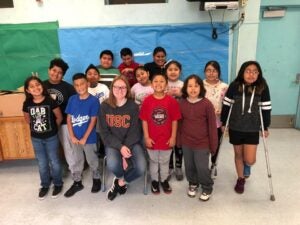 Special Education (SPED) Initiative
Special Education (SPED) Initiative
Originally Published May 8, 2018
This year was the inaugural year of the Young Scientist Program Special Education Initiative. At the beginning of August, a special education teacher at Norwood expressed interest in YSP. Based on my years of experience coaching people with intellectual disabilities on a Special Olympics team, as well as serving as a volunteer in a medical clinic for children with special needs, I adopted the Special Education Initiative as my own project within the broader context of YSP, to develop a science curriculum that addresses the needs of these students.
I adapted lessons from YSP’s existing science curriculum and created new lesson plans to fit the complex learning needs of special education students. The objective was to introduce scientific content that was challenging for these students, but still understandable. The Special Education Initiative developed through YSP provides students with practical life skills they require to live fulfilling lives after their structured education is over.


The first semester’s implementation of our special education program was a huge success, and we received extensive positive feedback from the teachers as well as the students and their parents. One of the teachers, Ms. Alicia Gibbs, had this to say about the program: “Children with learning and behavioral difficulties require unique instruction by specially trained professionals to help them achieve their highest potential and strive to progress beyond their limitations. The instructors at YSP have worked diligently to support the USC Family of Schools’ by providing a uniquely designed program tailored to the needs of our special education population that promotes unity, growth, acceptance, and understanding”.

After a successful first semester, the program expanded from two classes at Norwood Elementary School to total of five classes at three schools (Norwood, Vermont, and Weemes Elementary School). The amazing teachers who are currently participating in this program include Ms. Gibbs, Ms. Wilt, Mr. Vera, Ms. Chamul, and Ms. Morales.

This expansion was made possible in large part due to the addition of three incredible and enthusiastic volunteers: MaryAnn Cabrales, Karla Santoyo, and Dominique Sharp. Together, the four of us have continued to improve upon our existing science curricula and are constantly seeking new financial and academic opportunities to support the expansion of the program. Dominique Sharp expresses her positive thoughts on the program, saying “My kids were not only sweet but smart and eager to learn. They loved the experiments, especially engineering and testing tin-foil boats.” The success of the program is attributed to the dedication, passion, and patience of our new teaching assistants. The program will continue to develop so that the third through fifth grade special education classrooms have access to hands-on, inquiry-based science curricula, and will continue to cultivate a curiosity and thirst for science.